The US dollar has had a rough ride so far in 2017. The Federal Reserve’s Trade Weighted US Dollar Index that tracks the major currencies has tumbled roughly 8% year to date through last week’s close. The greenback’s slide, however, has delivered a substantial return premium for US investors who own foreign assets in funds sans currency hedging.
Consider the year-to-date performance for two ETFs that track the same index: MSCI EAFE, a popular benchmark of stocks in developed markets ex-US. The iShares MSCI EAFE (NYSE:EFA) is up a strong 16.9% this year (through August 15), nearly double the 9.2% for iShares Currency Hedged MSCI EAFE (NYSE:HEFA). The reason for stark difference in returns? HEFA hedges foreign currency risk and EFA doesn’t.
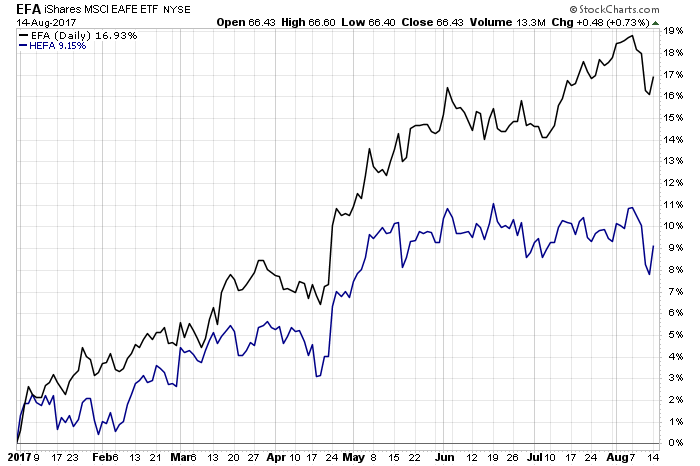
The dramatic gap in year-to-date results for the two funds suggests that currency hedging is a losing proposition. It can be… at times. But the longer run of history of forex exposure (or the lack thereof) paints a more nuanced profile.
The main takeaway: there are no one-size-fits-all solutions for deciding if currency hedging is worthwhile. To understand why, let’s start by reviewing how the Fed’s dollar benchmark has fared on a rolling one-year-return basis vs. the one-year performance spread for a US$-hedged version of MSCI EAFE Index less its unhedged counterpart. As the chart below shows, mean reversion has been the dominant theme on both fronts over the past three decades. Periods of dollar strength have prevailed at times, but not for long. Over time, the dollar’s influence has been more or less a wash, at least for the one-year time horizon.
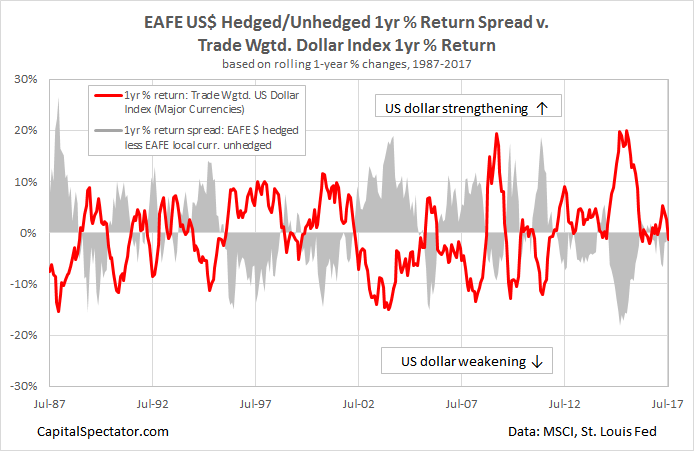
The results aren’t surprising. Most of the forex literature advises that currency trends, bullish or bearish, tend to be short-lived. A buy-and-hold investment in the Fed’s dollar index since the early 1970s has been more or less flat, offering a reminder that it’s best to assume that the expected return for forex through time is generally zero.
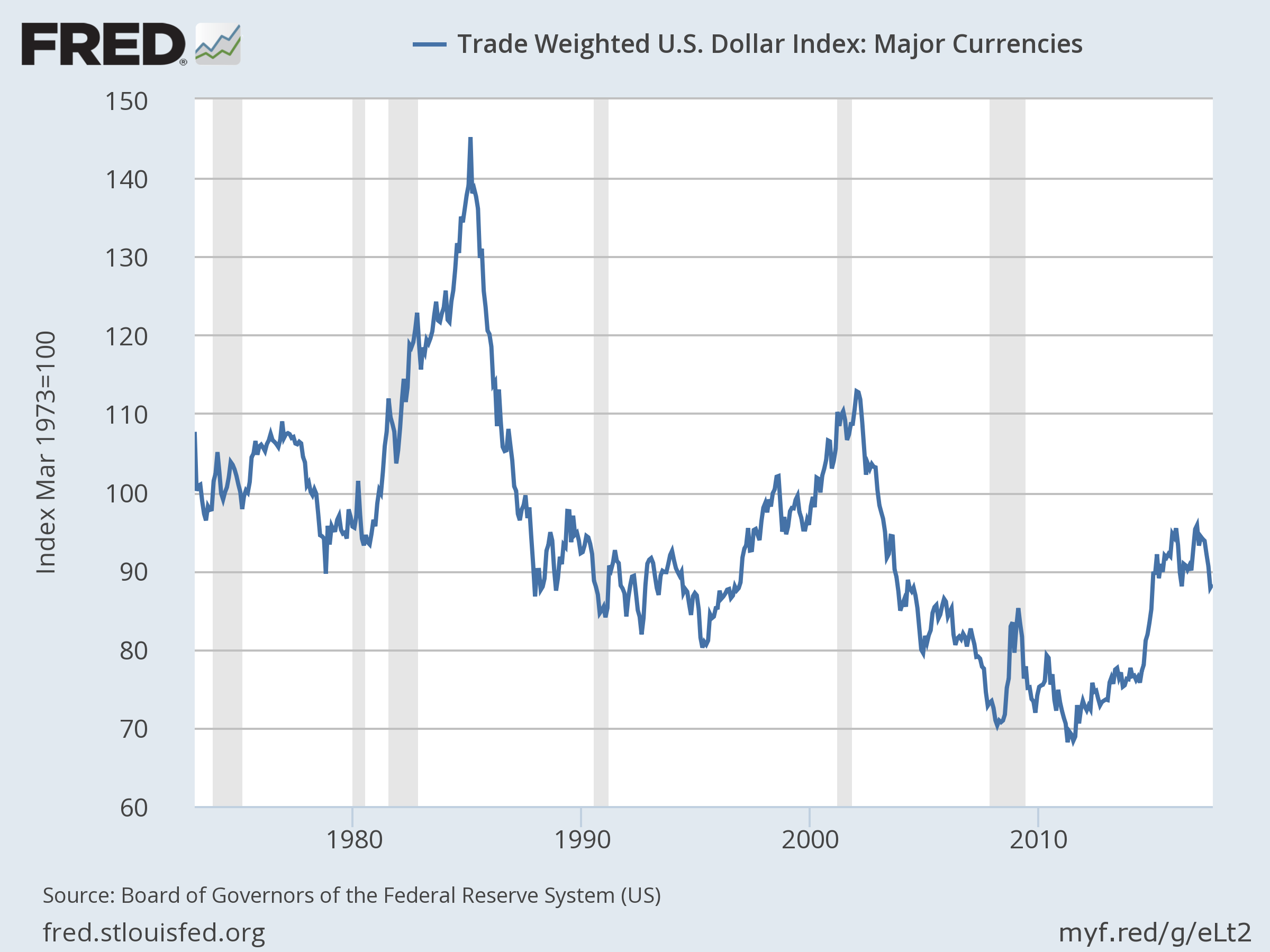
In the short run, by contrast, drama prevails in forex. Unfortunately, forecasting short-term currency movements is extremely difficult, largely because of the elephant in the trading room: central banks. The Federal Reserve, the European Central Bank, the Bank of Japan, and so on cast a long shadow over currency pricing, for reasons that can defy economic logic from the perspective of an investor. An added complication: central banks print their own money, which means that these institutions can pursue seemingly illogical forex policies for longer than you you can stay solvent.
One thing you can count on with forex when it comes to international equity investing: there’s a tight connection between the US dollar’s short-term trend and the impact on hedged and unhedged equity returns. A strong dollar tends to equate with negative returns for currency hedged equity performance, and vice versa.
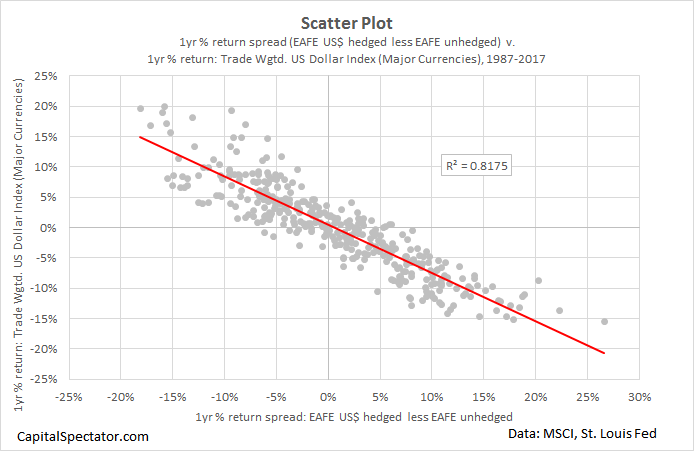
Note, however, that hedged version of EAFE has moderately outperformed the unhedged EAFE for the past 30 years. A $100 investment in currency hedged EAFE grew to roughly $241 by the end of last month (July 2017), a tidy premium over the unhedged EAFE’s ending value of $201.
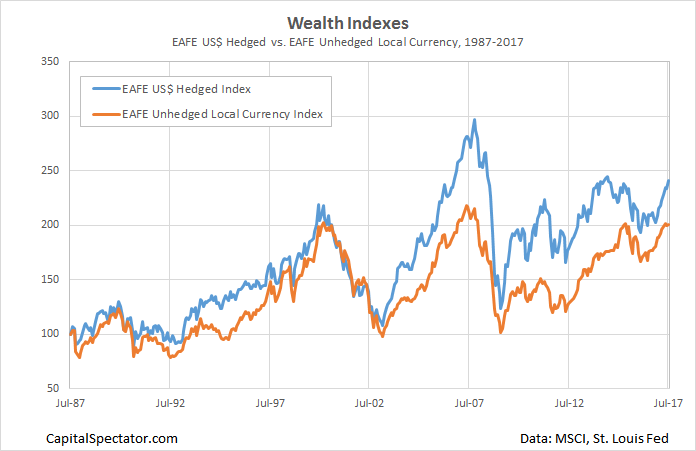
Looking at the chart above implies that currency hedging is a superior strategy and so it should prevail at all times for all US-based portfolios. Not necessarily because a final decision one way or the other depends on the investor’s risk tolerance, investment horizon, and portfolio design. As a standalone investment in foreign stocks, for instance, hedging can be compelling. As part of a diversified portfolio with various asset classes, by contrast, hedging’s advantages are open for debate.
For instance, consider that the hedged version of EAFE has a high correlation with US stocks (S&P 500 Index) for the past decade, based on monthly returns – roughly 0.92, or close to a 1.0 reading of perfect positive correlation. The equivalent correlation for the unhedged EAFE/S&P 500 comparison is substantially lower at just 0.34.
The implication: foreign equity investing offers a bigger diversification bang for the buck by forgoing currency hedging.
Another factor to consider: hedging isn’t free. There’s a cost to running a forex hedge. In addition, hedging strategies can differ, running the gambit from a relatively passive, steady plan to a quasi speculative operation. In short, when you’re choosing a fund that hedges forex, a big part of what you’ll earn (or lose) is bound up with how the hedging unfolds.
Yet some money managers are big fans of hedging, especially among stock pickers. Stripping out the forex effect, runs one argument, elevates security selection as the dominant influence in the portfolio. But that argument obviously has zero appeal if you’re holding index funds, which is all about beta.
The bottom line: unhedged equity investing — a.k.a. an embedded forex allocation — may or may not be productive, depending on the time period, investment strategy, etc. The strongest case for avoiding hedging is tied to portfolios that invest across asset classes with medium- to long-term time horizons. All the more so if most of a US-based investor’s asset allocation is dollar based.
To be fair, there’s no guarantee that introducing non-dollar risk exposure to your portfolio will be a winning decision. But the reverse is also true for hedging, which can end up as little more than an added expense.
How to decide? Start by asking youself a simple question: Do you really want to bet the farm on dollar strength, now and forever? If you’re less than 100% sure about an answer, there’s a strong case for adding a bit of unhedged forex beta to your asset allocation strategy.
